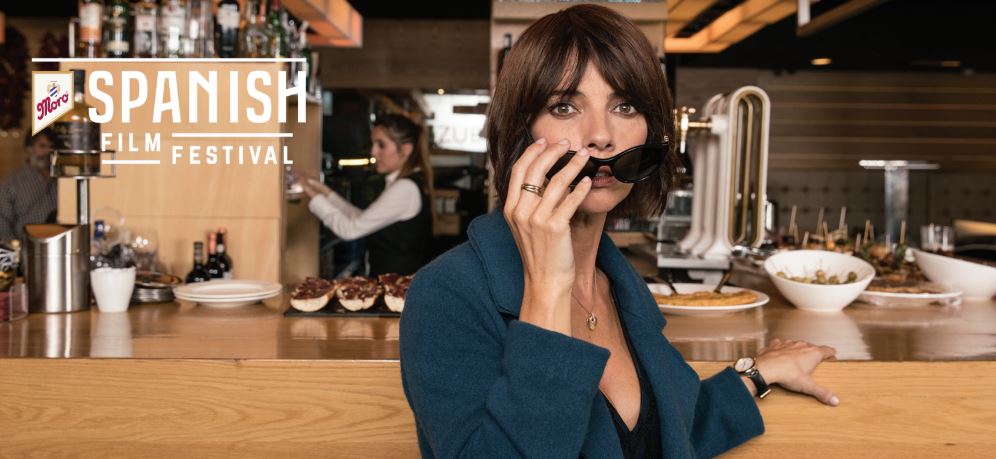By Alexandra Middleton | @alexandramidd16
Photo by: Received from media release
Surrounded by trays of tapas and Spanish speaking film enthusiasts, I was unsure of what to expect at my first foreign film festival. That said, Gracia Querejeta’s 2018 feature Ola De Crimenes (Crime Wave) was an unexpected comedic thriller and an immersive Spanish experience which shone a bright spotlight on females fighting for a cause.
The critically acclaimed Spanish director combines a wicked sense of humour with shocking illegal activities in her latest film, constructing a vibrant and unpredictable narrative for her audience. Spanish acting royalty Maribel Verdú’s animated performance as the film’s lead protagonist Leyre, facilitates the intensity and hilarity of Crime Wave, and exemplifies the female power dynamic which dominates the course of the film. Verdú’s ability to engage in diverse facial expressions and enlivened body language, from stretching her eyes wide in surprise to dramatically stumbling in her stilettos, adds to Leyre’s comedic charm while humanising her vulnerability.
Crime Wave’s circular narrative begins with Leyre attempting to repent her sins to a priest who is reluctant to hear out her confession. Querejeta tells the tale of Leyre’s crime wave in flashback form, which is riddled with a web of complicated and connected events and people, as well as an overarching dark sense of humour.
Leyre is uprooted from her comfortable life when her son (Asier Ricarte) nonchalantly stabs her unfaithful ex-husband and his horrendously cruel father, Cosme (Luis Tosar), out of quiet anger. Desperate to protect her son, Leyre’s attempt to cover up the murder triggers a sequence of unforeseeable deceit, illicit affairs and destruction. Despite her best efforts, Leyre becomes a key suspect in the murder when Cosme’s wife (and Leyre’s former best friend) Vanesa (Paula Echevarría), becomes involved in the investigation. This is followed by a wave of unfortunate, ghastly and sometimes accidental murders.
Vanessa and her lawyer Susana (Juana Acosta) — who ironically breaks the law on a regular basis — are clearly running the show, and by (illegal) extension, the murder investigation; illicit business negotiations and bribery are some of their many talents. Despite being the villains of the film, these two women act as vehicles for female autonomy and authority. They’re clearly in control of the obnoxious men around them, including their business partners and the police heading Cosme’s murder investigation; they use Cosme’s business as a front for money laundering and bribe the head investigator to frame Leyre for murder. They are the brains behind their blackmail and business deals, cleverly using theirs skills to manipulate those around them and hide their illegal activity. The drive of these two female characters to succeed at all costs, paired with the sheer tenacity of Leyre to protect her son despite the many aforementioned ramifications, highlights the importance of female power in this film.
Crime Wave is listed in the ‘Spotlight on Female Directors’ category as part of the Moro Spanish Film Festival. Querejeta emphasises the importance of motherhood through Leyre’s dedicated yet quirky parenting style, and celebrates female sexuality through her characters — especially Leyre — who partakes in a somewhat unconventional relationship, adding an element of light hearted humour to the film. However, the acclaimed director also highlights the harsh reality of female rivalry and betrayal; Vanesa’s intense jealousy of Leyre catalyses the competitive battle between the two women, driving Vanesa into a fit of rage where she pushes Leyre down the stairs. The violent fight between them which follows simultaneously reminds the audience of the significance of female empowerment and friendship.
Upon entering the cinema, I was anxious about trying to make sense of the subtitles while keeping up with the foreign on screen action, but despite being in a different language, Crime Wave did a spectacular job of being easy to follow. As the film progressed, I subconsciously lost sense of the fact I didn’t understand Spanish or that I was even reading subtitles. I was utterly immersed in the film; the visual narrative was told so well that I was able to simultaneously read the subtitles without being distracted from the fast-paced story. I was able to gasp in shock and laugh along with the rest of the cinema as if I were a true devotee of Spanish cinema.
The Moro Spanish Film Festival will run in Melbourne from April 18 – May 8 at Palace Cinemas, showcasing the best of Spanish and Latin American cinema. You can catch the Australian premiere of Crime Wave at Palace Cinemas from April 19.


